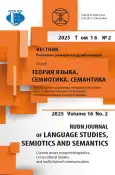Semantic Gestalt of the Associative Field of the Concept LAND of Speakers of Russian and Chinese Linguocultures Based on the Data of Free Associative Experiment
- Authors: Mitrofanova I.I.1, Wang Y.1, Barov S.A.2
-
Affiliations:
- RUDN University
- State University of Management
- Issue: Vol 16, No 2 (2025): Current issues in psycholinguistics, cross-cultural studies, and multichannel communication
- Pages: 441-455
- Section: PSYCHOLINGUISTICS
- URL: https://journal-vniispk.ru/2313-2299/article/view/323522
- DOI: https://doi.org/10.22363/2313-2299-2025-16-2-441-455
- EDN: https://elibrary.ru/EHDQFI
- ID: 323522
Cite item
Full Text
Abstract
The construction of the semantic gestalt of the associative field of the concept LAND in Russian and Chinese speakers using the results of the associative experiment is an actual problem. The concept LAND as a key cultural constant has a significant impact on the consciousness of speakers of two linguocultures. The purpose of this study is to identify the associative content of the word-stimulus ‘land’ and the ethno-cultural peculiarities of the peoples of Russia and China. The material of the study is word-reactions to the word-stimulus ‘land’ obtained in a free associative experiment conducted with 100 students of 5 Chinese universities and 100 students of 5 Russian universities. This study uses the method of free associative experiment and the method of semantic gestalt proposed by yu.N. Karaulov. According to the results of the study, the structure of the associative field of the concept EARTH is modelled and the semantic gestalt of this concept is constructed in speakers of two languages, 6 semantic zones (object, subject, action, evaluation and emotion, locus and others) are singled out. It can be concluded that the concept LAND has a connotative nominative field, which indicates the importance and uniqueness of this lexeme in the Russian and Chinese linguistic picture of the world and in the linguistic consciousness of modern youth of the two countries. The concept ‘land’ is characterised by both a relatively stable conceptual structure and a certain dynamism. In the linguistic consciousness of Russian and Chinese people paradigmatic associations occupy a dominant role, the land is perceived as home, motherland, mother, and first of all causes positive emotions and evaluations. This study allows us to create a more objective model of the linguistic consciousness of Russian and Chinese speakers.
About the authors
Irina I. Mitrofanova
RUDN University
Author for correspondence.
Email: mitrofanova_ii@rudn.ru
ORCID iD: 0000-0003-0532-8841
PhD in Sociology, Associate Professor, Associate Professor of the Department of Russian Language and Methods of its Teaching, Faculty of Philology
6 Miklukho-Maklaya St., Moscow, Russian Federation, 117198Yi Wang
RUDN University
Email: yi.wang@mail.ru
ORCID iD: 0000-0001-8071-1352
Postgraduate Student of the Department of Russian Language and Methods of its Teaching, Faculty of Philology
6 Miklukho-Maklaya St., Moscow, Russian Federation, 117198Sergey A. Barov
State University of Management
Email: barov1986@mail.ru
ORCID iD: 0009-0008-4844-1549
SPIN-code: 2325-8802
PhD in Political Science, Associate Professor of the Departments of World Economy and International Economic Relations
99 Ryazansky Ave., Moscow, Russian Federation, 109542References
- Vasilenko, S.S. (2019). Associative Experiment as a Way to Research a Concept for the Foreign Language Teaching Purposes. Language and Culture, (48), 76–86. (In Russ.). https://doi.org/10.17223/19996195/48/5 EDN: YYOHVZ
- Likhachev, D.S. (1997). Concept sphere of the Russian language. In: Russian literature: from the theory of literature to the structure of the text (pp. 280–287). Moscow: Academia. (In Russ.).
- Stepanov, Yu.S. (1997). Constants: Dictionary of Russian culture. Moscow: Languages of Russian Culture. (In Russ.).
- Vorkachev, S.G. (2003). Standard in comparative semantics. In: Language, consciousness, communication (pp. 6–15). Moscow: Max. (In Russ.). EDN: UBCOTD
- Karaulov, Yu.N. (2000). Indicators of National Mentality in the Associative-Verbal Chain. In: Language Consciousness and Image of the World. Collection of Articles, N.V. Ufimtseva (Ed.) (pp. 191–206). Moscow. (In Russ.). EDN: SIJQLH
- Sternin, I.A., & Bykova, G.V. (1998). Concepts and Gaps. In: Language Consciousness: Formation and Functioning, N.V. Ufimtseva (Ed.) (pp. 66–67.). Moscow. (In Russ.). EDN: VPJEVJ
- Borisova, S.A. (2006). Metaphors “Heaven” and “Earth” in Germanic Languages (against the Indo-European Background) [PhD thesis]. Moscow. (In Russ.).
- Semenov, A.E. (2009). Verbalization of the concept “earth” by means of Russian phraseology and lexicology [PhD thesis]. Moscow. (In Russ.).
- Zhao, Xiuqing (2010). SKY and EARTH in the Russian linguistic picture of the world [PhD thesis]. Moscow. (In Russ.).
- Li, Chang (2016). Study of the concept land in the Russian language under the threshold of linguoculture. Changchun: Northeast Normal University. (In Russ.).
- Zhang, Tingting (2023). Analysis of the concept “land” in the novel “Quiet Flows the Don” in the linguocultural aspect. Harbin: Harbin Polytechnic University. (In Russ.).
- Karaulov, Yu.N. (1994). From the structure of the associative dictionary to the structure of linguistic ability. Russian Journal of Linguistics, (1), 15–26. (In Russ.).
- Popova, Z.D., & Sternin, I.A. (2007). Cognitive linguistics. Moscow: AST: Vostok-Zapad. (In Russ.).
- Belyanin, V.P. (2004). Psycholinguistics. Moscow: Flinta: Moscow Psychological and Social Institute publ. (In Russ.).
- Admoni, V.G. (1988). Grammatical structure as a system of construction and general theory of grammar. Leningrad: Nauka publ. (In Russ.).
- Chzhan, Ing (2015). The Concept “Earth” in the Chinese and Russian Pictures of the World. Philology. Theory & Practice, 11–3(53), 209–212. (In Russ.). EDN: UMMKFP
- Shen, Ping (2015). The Study of Earth Consciousness — A Cognitive Perspective Based on the Thought of Mother Earth. Hangzhou: Zhejiang University publ. (In Russ.).
- Moshina, E.A. (2020). Gender and Theomorphic Signs of the «Earth-Mother» Mythologeme in Russian Linguistic Culture. SibScript, (1), 251–257. (In Russ.). https://doi.org/10.21603/2078-8975-2020-22-1-251-257 EDN: PAPMFF
- Zhao, Xiuqing (2010). SKY and EARTH in the Russian Linguistic Picture of the World [PhD thesis]. Moscow. (In Russ.).
Supplementary files









